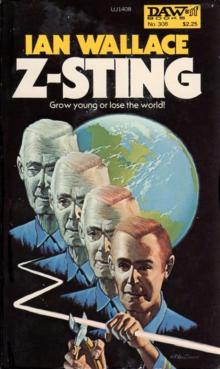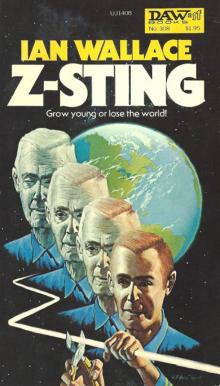- Home
- Ian Wallace
Lucifer Comet (2464 CE) Page 6
Lucifer Comet (2464 CE) Read online
Page 6
Making her flush very deep, Dorita stood, pouted angrily down upon him, opened two more shirt-buttons, and told him coolly: “You take it from here. I won’t be fighting.”
Feeling his own arousal, Methuen rode herd on it: he could be getting Erthworld and Astrofleet and her and himself into deep trouble. He drained his drink and told her calmly: “Maybe later, Miss Lanceo, but we need to talk here first. Pray button-up and sit down while I make myself another drink. May I sweeten yours?” He arose with his glass and went for hers.
Her complexion went from crimson to pale. Taut, she said: “Commander, I’m sorry, I misjudged you, my approach was wrong. In all honesty you do excite me and I would enjoy doing this for you, but I know that you are testing me and this isn’t the way I should be tested. I do want very much to help you with the comet-creatures; and the main way I can help you is, that I am a telepath. So I know everything that you’ve been thinking. And I really am only seventeen, but believe me, Fm plenty precocious. But we shouldn’t make love first, because a man like you will then feel obligated to me, and you shouldn’t. So let’s talk business first, and you make your decision about me one way or another—me helping you with the creatures, I mean. And after that, either way your decision goes about my help, we can still hit the shag if you want to—or not if you don’t.”
Astonished, he gazed at her. Slowly she rebuttoned the two buttons, leaving the top three open, keeping her eyes on his eyes. He said at length, gruff: “Sit down, I’ll be back.” And he went to replenish drinks.
They were on his sofa now, discreetly separate, talking earnestly, sipping slowly. He had begun the talking on his return: “You say you’re a telepath, Miss Lanceo.”
“Right. I guess you get my point. The comet-creatures don’t talk Anglian or, probably, any live terrestrial language. But with my telepathy, I can be a two-way translator.”
“Miss Lanceo, we expect a linguistic expert from Centralia any day now.”
“As soon as tomorrow?”
“Well, probably not—”
“But you want to start interviews with the creatures tomorrow. At least for tomorrow, you’ll need me.”
“You said you’d read all my thoughts tonight. Tell me what they were.”
She told him, in near-total detail, to the extent that long before the end of her recital he was persimmon-grinning into his drink. Laying a gentle hand on his shoulder, she appealed: “Don’t feel offended, these thoughts demonstrate that you are really a very kind man. Believe me, a telepath knows a lot of other kinds, and so does any woman.”
He looked at her: “Can you cut it off?”
“Sure I can. I did not read anything since you returned from the kitchen.”
“How do I know that?”
“You have to take my word.”
“I ought to test your telepathic ability more objectively. Miss Lanceo, can you condition your reading so that you read only what I want you to read and nothing else?” “Absolutely I can do that. I’d prefer that.”
“What am I thinking now?”
“You are thinking, Next year in Jerusalem, and you are thinking it in Sinitic. But I don’t think you are a Sinite.”
“I learned the phrase from my executive officer. Very good, Miss Lanceo. But of course, I’ll have to get government clearance—”
“You have to delay for that?”
“No delay. Come over here.” Arising and taking her hand, he led her to his recorder-communicator. “Just flake-in your full name, birth date, birthplace, parentage, and ID number; and then I’ll have to take a retinal photo.”
All this was done, with one small delay: “My ID number? Oh, dear, I never can remember that. Let me go to my purse—”
Presently he transmitted. “We should have a reply in a few minutes,” he told her. “The computer is open all night. I do have to say, though, that it may not be possible to get you appointed as a paid staff member.”
“I am volunteering,” she assured him. “I don’t need pay.”
“Shall we have another drink while waiting?”
“Do you have some cream sherry?”
“Of course. Will Harvey’s do?”
“Exquisite! On the rocks, please. But first I have to make a pit stop.”
When she returned, he met her with two glasses of Harvey’s on the rocks. She read his thought, On the rocks yet! Grinning, she accepted one and sipped. Saying, “Enjoy and excuse me,” he set down his glass and hit the corridor. She was pleased with his thought about the rocks: with Harvey’s it was blasphemy, and she agreed, but the rocks had sounded nicely naive. She was sacrificing for a role, he for courtesy.
When he returned, she was standing beside the recorder-communicator, staring at the print-out which it was emitting like an impudent white tongue. She had removed her sandals; she was barefoot on the shag. He ripped out the communication and read it aloud: repeat of the data she had fed in; then: “Father, executive Nellbrook Enterprises, Chicago; mother, homemaker, deceased 2459; no adverse record father or mother. Subject graduated High School No. 5, Chicago, 2463; no known further education. Employed waitress Zingfood Restaurant No. 21 Manhattan 2 July 63 to 7 Sept 63, waitress Shoshone Steakhouse Manhattan 8 Sept 63 to present. Finances: checking and savings accounts main office Hazlitt National Bank Manhattan; av bal checking Cr 97, savings Cr 481; end financial information. No adverse record subject. Cleared for constellational work with access to matter classified classified but no higher pending further information.”
He looked down at her face. “If you’re an employed waitress, how can you work with me tomorrow?”
“I just quit. I’ll tell them tomorrow.”
“But you said you don’t need a salary. With shoestring finances like that, how can you quit your job?”
Fast lie: “Daddy does fine; he’ll grubstake me. But that limitation, matter no higher than classified?—is that bad, Commander?’”
“The comet-creatures are classified classified, no higher, pending further information. You’re in for now.”
She took the print-out from his hands, read it rapidly, dropped it on the floor. She turned up a tremulous face, saying, “My bare feet like your shag.”
Somewhen in the delicious course of that night, Methuen fell in love with Dorita. He didn’t tel! her so, because he wanted to think about the question calmly, away from her.
She knew it anyway, and idly she wondered whether she had reciprocal feelings; but acute erotic pleasure tended to glare-out that sort of deeper soul-sensitivity.
Prevoyance Two
Just before he awakened, Methuen sweated through a preview of a second 2465 attack. In his dream, he was an Astrofleet captain attempting to depart Erth aboard his space frigate; the ship proved absolutely lifeless, no system responded at all, 546. After an hour of intensive diagnosis, he had to decide that his ship was inexplicably dead; he could not even send a radio call to headquarters, 546. Quitting the ship, he found a base telephone and put in a priority call—and he learned that no ship anywhere around could be activated, 546. He was ordered to attend a Fleet Admiral’s Call in one hour. (The date was 15 January 2465.) At the conference, the admirals and captains of Norwestia Astrofleet were informed by the Fleet Admiral that, so far as could now be determined, every grounded ship in every Erth-world constellation was out of commission. No cause had been assigned, 546….
It was meaningless dreaming, of course, he adjudged on reawakening to the realities of 2464; and the dream-recurrence of the number 546 could be related to the recent comet-prominence of the gradient. On the other hand, 546 had occurred in his first dream, before the comet.
Part Two
THE QUARFAR-NARFAR
QUANDARY
8
Methuen and Zorbin and Dorita met in the front lobby of the Science Center. Any trepidation that Methuen had felt about her working attitude was dissipated when she greeted him with impersonal cordiality and a cool handshake. On this morning after, Methuen was no longer sure
that he was in love. He liked Dorita very much, and her savoir faire at this morning’s meeting added to that. Perhaps he should pursue last night’s relationship; perhaps not. He back-burnered the question.
He presented her to Zorbin as “Miss Lanceo who has some interesting qualifications as a telepath.”
Zorbin shook hands cordially, remarking: “I understand how your talents may prove helpful, but it will be difficult.”
They were admitted by a pre-advised attendant into a small darkened room. “That wall,” said the attendant, “is a one-way screen; we thought you might wish to observe unseen. Wien you are ready to enter the other room where the specimen is capsuled, use this door. If you want me, just call; I will hear you.” He departed.
Through the one-way screen, peering into a lighted chamber, they watched the humanoid, who still was naked. Within his tiny capsule, interestingly, he was jogging in place, disregarding the resultant floppery of his respectable genitals. The two men and the women gazed in something like awe: this humanoid was human, his brown body was athlete-perfect, his blond semi-long hair had just a touch of natural wave, his gray eyes were clear, his expression was serene.
“That,” Zorbin growled, “is an inhumane way to confine him.”
“Agreed,” said Methuen, “but maybe we can get that corrected. Are both of you ready to go in to him?”
Passing through a door, they stood before the encapsulated humanoid, who paused in his jogging and turned to regard them with interest.
The attendant had provided three chairs outside the capsule; Methuen took the central one, he was in command, the lady must follow; Dorita sat at his left, Zorbin at his right. Dorita saw the subtle point of the Methuen seat-maneuver, and it worked: inside the capsule, the humanoid also seated himself, and the whole affair took on the tone of a meeting rather than a confrontation. It interested Dorita that the humanoid was unembarrassed about his nakedness in the presence of a strange woman who was clothed. She wondered whether they should undress—and then she grasped that the humanoid was also undisturbed by their clothing.
Methuen began to talk soothingly; the words did not matter in the absence of common language, they would anyhow sound to the slow-basso man-creature like bat-twittering. The interviewee got the idea; and when Methuen fell silent, instantly the humanoid responded with his reverberating roar, not taking too long over his response, merely indicating that he was willing to talk if a way could be found.
Part of the way could be mechanical: Methuen carried a pocket recorder, and he played back his own voice in slowed tempo while the creature listened attentively but with a look of confusion, then the creature’s roar in speeded tempo while the creature showed new interest and several times nodded eagerly. Still there was no real communication; but Zorbin muttered, “I keep having that sense of distorted Tellenic, and I swear I heard the Tellene word for man.”
The Astrofleet officers were thinking; Dorita was ready to act, but she waited. At length Methuen turned her loose: “See what you can do.”
Standing, Dorita advanced to the capsule wall; the captive stood also, he was more than two meters tall. Dorita pointed, first to her mouth, then to her ear, then to her forehead; the prisoner nodded. Repeatedly Dorita tapped her forehead, then pointed high to the creature’s forehead; he went into thought, then his eyebrows rose and he nodded rapidly.
“Record all this,” she ordered Methuen. Then she spoke aloud for the flake, while mind-projecting the statement to the creature: “I am a woman,” she said, and with both hands she indicated her breasts. Instantly he replied, I am a man; and he pointed to his phallus. She told Methuen’s recorder: “He said, ‘I am a man.’ ” Indeed, Zorbin noted, a word somewhat like anthros had been pronounced.
So was laid a foundation for language-cracking.
In his ad hoc assignment as Chairman of the Interconstellational Task-Force on Ice-Comet Aliens, Methuen had been detached from Astrofleet and attached to an assistant secretary of Education, Science, and Culture. Shortly after noon that day, Methuen phoned his new chief with a report that preliminary communication with the humanoid alien had been established, that this alien was intelligent and cooperative, and that for him, some degree of freedom under supervision would be far more productive than continued capsule-confinement. Responded the assistant secretary, “I leave the arrangements to your discretion, Captain—including the matter of clothing.”
It was Methuen’s first intimation that in fact he had been promoted.
So the problem of alien humanoid disposition was Methuen’s, and he hadn’t the least practical idea how to discharge it. Zorbin suggested his own apartment, he had a spare bedroom; but Methuen felt that the chairman should personally assume responsibility.
Unexpectedly Dorita suggested: “You three men could move in with me.”
Demanded Zorbin: “You have three extra bedrooms?”
“No, wait, I mean this. There’s an apartment in my building with three bedrooms, I can get it. This creature can have one bedroom, you two men the others, I’ll bunk on the sofa, I get along fine with sofas. That way I’ll be round-the-clock available for translations.”
Methuen had his emotional reservations, but Zorbin’s presence would help calm things. It was agreed, and Methuen dispatched her to make the arrangements while he and Zorbin would take a preliminary look at Batwing.
Dorita went home. Visiting the landlady, she proposed a swap of apartments between herself and the family who occupied the three-bedroom suite, accompanying the suggestion with an implanted mental imperative. Necessarily agreeing, the landlady phoned the family and asked for the move before day’s end. The shocked wife-mother demanded to know why. Dorita got on the phone and pleaded an urgent need, meanwhile directing a sympathy-imperative along the phone’s carrying beam. The woman instantly saw the point (didn’t she?) but raised a question as to how she would convince her husband and three children to move immediately into a one-bedroom apartment. Dorita assured her, “Believe me, you’ll have no problem at all,” meanwhile implanting in the woman a radiant imperative which would guarantee consent by the others. By 1800 hours, it was done; moving was a minimum difficulty because both apartments were furnished. If there was injustice and even hardship for that family, Dorita was untroubled: it wasn’t her usual style, but the need was absolute, and she planned to route their way a few thousands out of her squirreled bank loot.
Having dispatched her mission, she phoned the Science Center. After a five-minute wait, Methuen’s face appeared on visiscreen. Dorita said cheerily, “It’s fixed, Commander. If you have a pencil, I’ll give you the address and apartment number—”
He interrupted: “Dorita, first let me tell you about Batwing.”
“I’m listening—”
“He’s gone.”
“Pardon?”
“Vanished. Lock, stock, and wings, Neanderthal forehead and all. Zorbin is here trying to convince the attendant that it’s really true.”
“But how?”
“Nobody can begin to explain it. The attendant let us into a viewing room just as before, and there Batwing was, in his capsule, sort of abject and wing-droopy. After we’d studied his apathy for a few minutes, we went on into the room where his capsule was. Well, he wasn’t in the capsule anymore. And the capsule was firmly locked; the shocked attendant saw to that himself.”
“Are you telling me that it happened before your very
eyes?”
“As near as possible, yes. We had our eyes off of him during the few seconds it took us to pass through the door.”
After brief meditation, Dorita said, “I think we need some answers from Quarfar.”
“From whom?”
“Quarfar. Didn’t I tell you? That’s the humanoid alien’s name.”
“For that, Dorita, we need you”
“Later, but not much later. You and Zorbin arrange for the transfer of Quarfar and get him here about 2000 hours; we can dial dinner here. Go ahead and get on with it, C
ommander.” Disconnect.
Methuen, beginning to wonder who was in charge here, turned to Zorbin and relayed the command.
Command?
One 546 dream was bad enough; the reinforcing second dream was dismaying, and it was Dorita who had been in bed with him when he dreamed it; now the 546 comet-Satan had gone on the loose in Dorita’s presence, and Dorita was beginning to control Methuen. Well, Methuen could reassume control over Dorita, but not over his possibly prevoyant dreamings. Quarfar would have to undergo a lot of questioning.
9
Methuen had, of course, immediately reported the escape to his new chief. “Not your fault, Captain,” pronounced the assistant secretary, “and we’ll put that in the record; but a lot of public hazard could result, and I’ll see to that.” The assistant secretary alerted the Manhattan police, the Constellational Bureau of Investigation and Interpol: fiend on the loose; then he sat back, grim, to await developments.
This time Methuen was unstartled by being called Captain; he’d received official verbal notice. He told Zorbin—who would tell Dorita, for whatever that might be worth. But he did not yet change his rank insignia pending an official printout; he considered it bad luck to jump guns.
Zorbin had gone shopping in a tall store for creature-clothing, having a good eyeball-idea of the Quarfarian dimensions. He returned to the Science Center with sport shirt, undershorts, Bermuda shorts, elastic socks, adjustable sandals (luckily it was summer, the tricky shoe-size problem could be bypassed). Quarfar, released from his capsule, accepted the proffered clothing and donned it; he seemed to comprehend the use of each garment after brief inspection, but it took him several minutes to master touch-zippers. The sandals were tight, but he managed. Then Methuen said to Zorbin, “Let’s not hold him, but be ready to grab him if we must.” Zorbin queried: “What about guiding him?”

 Megalomania
Megalomania Z-Sting (2475 CE)
Z-Sting (2475 CE) The World Asunder
The World Asunder Z-Sting
Z-Sting Lucifer Comet (2464 CE)
Lucifer Comet (2464 CE) A Voyage To Dari
A Voyage To Dari Pan Sagittarius (2509 CE)
Pan Sagittarius (2509 CE) The Rape of The Sun
The Rape of The Sun